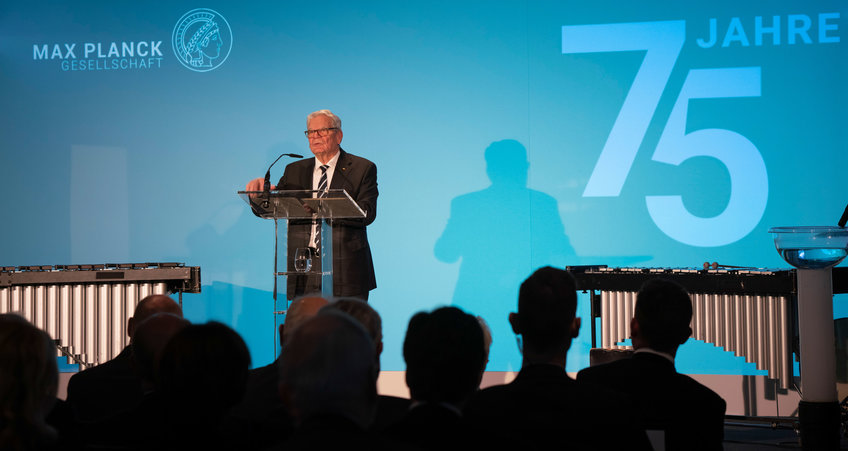75 years Max Planck Society
The research institution marked its 75-year milestone anniversary with a festive ceremony at the Deutsches Museum in Munich
On February 26, 2023, the Max Planck Society (MPG) welcomed more than 200 guests to a ceremony at the Deutsches Museum to celebrate its founding 75 years ago - among them Federal Research Minister Bettina Stark-Watzinger, Science Minister Falko Mohrs from Lower Saxony, the state where the MPG first found its home, and U.S. Consul General Timothy Liston. The opening speech was given by Joachim Gauck, former Federal President and Senator of the Max Planck Society. The social historian Jürgen Kocka, winner of the international Holberg Memorial Prize and member of the collegium of the research group on the history of the MPG, explained in his keynote speech how much the Max Planck Society has been an integral part of contemporary German and European history. Afterwards, the exhibition "Pioneers of Science - the Nobel Laureates of the Max Planck Society" was opened.

The ceremony began with a musical introduction by the duo Double Drums, Alexander Göggler and Philipp Jungk. Their virtuoso marimba playing set the tone for a festive evening. As a first speaker, Max Planck President Martin Stratmann congratulated the MPG and said his wishes for the "birthday 'child' were the same as to someone much younger than 75 years: ".. a long life, courage to express one's talents, the ability to always seek and find exciting paths off the beaten track, coupled with a healthy measure of non-conformity, a longing for intellectual fulfilment and: a sheer endless curiosity."
"Basic research, driven by curiosity, has always been the guiding principle of the MPG. As historian Jürgen Kocka later said in his keynote address, this focus on basic research was also a result of the Allies' stipulations that the successor organization to the Kaiser Wilhelm Society should be prohibited from conducting any research that could be exploited for military purposes as well as from conducting industry-related research. "Basic research as a trademark. The constraints of the occupying power thus set the course that sustainably strengthened the MPG's autonomy and its relative distance from industry and politics." And that is still the case today.
"Understanding must precede change"
Former Federal President Joachim Gauck emphasized right at the beginning of his speech that he had been very happy to come to Munich, "not only because there was something to celebrate, but also because here, surrounded by researchers, I find a great deal of what drives and moves me: curiosity and the quest for knowledge. The skepticism towards supposed ultimate truths. But above all: the conviction that we can only fully develop our potential in freedom. And in addition, the awareness of the responsibility that follows from this knowledge."
Germany, so Gauck, was a country poor in raw materials, but rich in research, ideas and inventiveness. But before anything can be invented, knowledge, data and facts are needed, which the Max Planck Society provides with its basic research. "I am certainly not exaggerating when I say that scientific knowledge is our country's most important raw material and that the Max Planck Society is of central importance in extracting this raw material," Gauck said.
But the former Federal President also brought with him a concern for the future: rarely in human history have we been as dependent on research support as we are today. Referring to Max Planck's quote that insight must precede application, he said that today we should therefore say, "Understanding must precede change." He added that the current crises - the pandemic, the Russian attack on Ukraine, and climate change, arguably the greatest challenges - have highlighted, even outside the research community, the importance of science in two ways: firstly, in understanding crises, and secondly, in overcoming them.
Joachim Gauck concluded: "There is a whole world in every research. And every new question in turn opens up new worlds. And this will be the case as long as there are researchers. My warmest congratulations on 75 years of science, wonder, and insights!”
The Max Planck Society as a mirror of contemporary history
The renowned historian Jürgen Kocka then spoke about "Harnack's late heirs. The Metamorphoses of the Max Planck Society since 1948". He elaborated on the eventful history of the MPG, which, however, cannot be considered without its predecessor organization, the Kaiser-Wilhelm-Gesellschaft (KWG). In particular, he discussed how the history of the MPG has been an integral part of contemporary German and European history. First, he used the example of three points of departure - 1948, 1972, and 1990 - to show how much the development of the MPG had been shaped by general contemporary historical factors. He then went on to show how, conversely, the MPG had influenced general contemporary history.
BK
Note: the original article dated February 20, 2023, has been updated.












